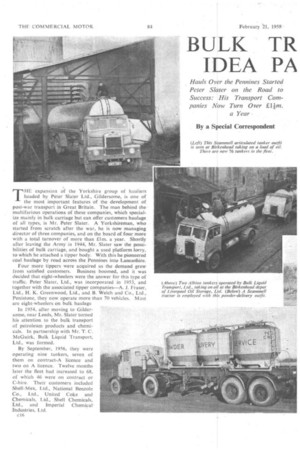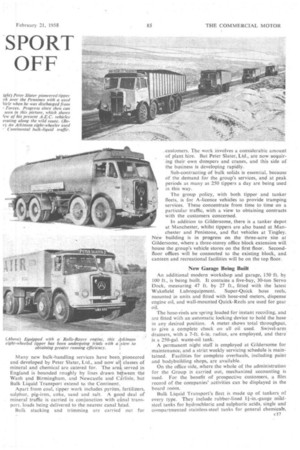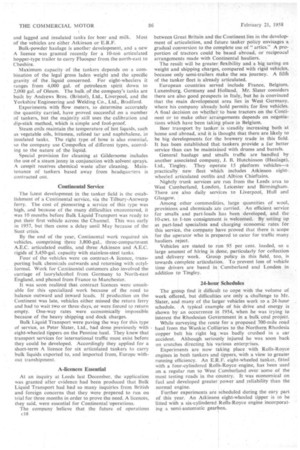BULK TR EA PA SPORT OFF
Page 54

Page 55

Page 56

If you've noticed an error in this article please click here to report it so we can fix it.
By a Special Correspondent
\
THE expansion of the Yorkshire group of hauliers headed by Peter Slater Ltd., Gildersome, is one of the most important features of the development of post-war transport in Great Britain. The man behind the . multifarious operations of these companies, Which specialize mainly in bulk carriage but can offer customers haulage of all types, is Mr. Peter Slater. A Yorkshireman, who started from scratch after the war, he is now managing director of three companies, and on the board of four more with a total turnover of more than Elm. a year. Shortly after leaving the Army in 1944, Mr. Slater saw the possibilities of bulk carriage; and bought a used platform lorry, to which he attached a tipper body. With this he pioneered coal haulage by road across the Pennines into Lancashire.
Four more tippers were acquired as the demand grew from satisfied customers. Business boomed, and it was decided that eight-wheelers were the answer for this type of traffic. Peter Slater, Ltd., was incorporated in 1953, and together with the associated tipper companies—A..1. Fraser, Ltd., H. K. Greenwood, Ltd., and B. Welch and Co., Ltd., Penistone, they now operate more than 70 vehicles. Most are eight-wheelers on bulk haulage In 1954, after moving to Gildersome, near Leeds, Mr. Slater turned his attention to the bulk transport of petroleum products and chemicals. In partnership with Mr. T. C. McGuirk, Bulk Liquid Transport, Ltd., was formed.
By September, 1956, they were operating nine tankers, seven of them on contract-A licence and two on A licence. Twelve months later the fleet had increased to 68, of which 46 were on contract or C-hire. Their customers included Shell-Mex, Ltd., National Benzole Co., Ltd., United Coke and Chemicals, Ltd., Shell Chemicals, Ltd., and Imperial Chemical' Industries, Ltd.
Many new bulk-handling services have been, pioneered and developed by Peter Slater, Ltd., and now alt classes of mineral and chemical are catered for. The area served in England is bounded roughly by lines drawn be,Itween the Wash and Birmingham, and Newcastle and Ghlisle, but Bulk Liquid Transport extend to the Continent.
Apart from coal, tipper work includes pyrites, fertilizers, sulphur, pig-iron, coke, sand and salt A good deal of mineral traffic is carried in conjunction with cAnal transport. loads being delivered to the nearest canal head.
Bulk stacking and tr rnming are carried out for -customers. The work involves a considerable amount • of plant hire. But Peter Slater, Ltd., are now acquiring their own dumpers and cranes, and this side of the business is developing rapidly.
Sub-contracting of bulk solids is essential, because of the demand for the group's services, and at peak periods as many as 250 tippers a day are being used in this way.
The group policy, with both tipper and tanker fleets, is for A-licence vehicles to provide tramping services. These concentrate from time •to time on a particular traffic, with a view to obtaining contracts with the customers concerned.
In addition to Gildersorne, there is a tanker depot at Manchester, whilst tippers are also based at Manchester and Penistone, and flat vehicles at Tingley. New building is in progress on the three-acre site at Gildersomc, where a three-storey office block extension will house the group's vehicle stores on the first floor. Secondfloor offices will be connected to the existing block, and canteen and recreational facilities will be on the top floor.
New Garage Being Built An additional modern workshop and garage, 150-ft. by 100 ft., is being built. It contains a five-bay, 30-ton Servo Dock, measuring 47 ft. by 27 ft., fitted with the latest Wakefield Lubrequipment. Super-Quick hose reels, mounted in units and fitted with hose-end meters, dispense engine oil, and wall-mounted Quick-Reels are used for gear oil.
The hose-reels are spring loaded for instant recoiling, and are fitted with an automatic locking device to hold the hose in any desired position. A meter shows total throughput, to give a complete check on all oil used. Swivel-arm drainers, with a 7-ft. 6-in, radius, are employed, and there is a 250-gal. waste-oil tank.
A permanent night stall is employed at Gildersome for maintenance, and a strict weekly servicing schedule is maintained. Facilities for complete overhauls, including paint and bodybuilding shops, are available.
On the office side, where the whole of the administration for the Group is carried out, mechanized accounting is used. For the benefit of prospective customers, a film record of the companies' activities can be displayed in the board room.
Bulk Liquid Transport's fleet is made up of tankers, of every type. They include rubber-lined Li-in.-gauge mildsteel tanks for hydrochloric and sulphuric acids, single and compartmented stainless-steel tanks for general chemicals,
and lagged and insulated tanks for beer and milk. Most of the vehicles are either Atkinson or E.R.F.
Bulk-powder haulage is another development, and a new A licence was granted recently for a 10-ton articulated hopper-type trailer to carry Fluospar from the north-east to Cheshire.
Maximum capacity of the tankers depends on a combination of the legal gross laden weight and the specific gravity of the. liquid concerned. For eight-wheelers it ranges from 4,000 gal, of petroleum spirit down to 2,000 gal. of Oleum. The bulk of the company's tanks are built by Andrews Bros. (Bristol), Ltd., Liverpool, and the Yorkshire Engineering and Welding Co., Ltd., Bradford.
Experiments with flow meters, to determine accurately the quantity carried, have proved successful on a number of tankers, but the majority still uses the calibration and dip-stick method, which is simple and fool-proof.
Steam coils maintain the temperature of hot liquids, such as vegetable oils, bitumen, refined tar and naphthalene, in. insulated tanks. The right type of hose is also essential, so the company use Compoflex of different types, according to the nature of the liquid.
Special provision for cleaning at Gildersome includes the use of a steam jenny in conjunction with solvent sprays. A cesspit receives chemical waste after cleaning. Maintenance of tankers based away from headquarters is contracted out.
Continental Service
The latest development in the tanker field is the establishment of a Continental service, via the Tilbury-Antwerp ferry. The cost of pioneering a service of this type was high, and because of the many difficulties encountered, it was 10 months before Bulk Liquid Transport was ready to put their first vehicle across the Channel. This was early in 1957, but then came a delay until May because of the Suez crisis.
By the end of the year, Continental work required six vehicles, comprising three 3,800-gal., three-compartment A.E.C. articulated outfits, and three Atkinson and A.E.C. rigids of 3,450-gal. capacity with stainless-steel tanks.
Four of the vehicles were on contract-A licence, transporting bulk chemicals outwards and returning with octylformal. Work for Continental customers also involved the carriage of laurylalcohol from Germany to North-east England, and phenol from France to Manchester.
It was soon realized that contract licences were unsuitable for this specialized work because of the need to balance outward and inward loads. If production on the Continent was late, vehicles either missed the return ferry and had to wait two or three days, or were forced to return empty. One-way rates were economically impossible because of the heavy shipping and dock charges.
Bulk Liquid Transport were paving the way for this type of service, as Peter Slater, Ltd., had done previously with eight-wheeled tippers on the Pennine haul. They knew that transport services for international traffic must exist before they could be developed. Accordingly they applied for a short-term A licence for six articulated tankers to carry bulk liquids exported to, and imported from, Europe without transhipment.
A-licences Essential
At an inquiry at Leeds last December, the application was granted after evidence had been produced that Bulk Liquid Transport had had so many inquiries from British and foreign concerns that they were prepared to run on trial for three months in order to prove the need. A licences, they said, were essential for Continental operations.
The company believe that the future of operations cl 8 between Great Britain and t e Continent lies in the development of articulation, and f ture tanker policy envisages a gradual conversion to the complete use of " artics." A proportion of tractors could be based abroad, or reciprocal arrangements made with C ntinental hauliers.
The result will be greater flexibility and a big saving on weight and shipping charge , compared with rigid vehicles, because only semi-trailers ake the sea journey. A fifth of the tanker fleet is alread articulated.
European countries serv d include France, Belgium, Luxemburg, Germany and olland. Mr. Slater considers there are also good prospec s in Italy, but he is convinced that the main developmen area lies in West Germany, where his company already hold permits for five vehicles. A final decision on whether to base tractors on the Continent or to make otherarr ngernents depends on negotiations which have been takin place in Belgium.
Beer transport by tanker is steadily increasing both at home and abroad, and it is hought that there are likely to be big developments for t c brewery trade in this field. It has been established tha tankers provide a far better service than can be maintai ed with drums and barrels.
General haulage and s ails traffic are handled by another associated compan , J. B. Hutchinson (Haulage), Ltd., Tingley. They operate 15 platform vehicles—a practically new fleet which includes Atkinson eight-, wheeled articulated outfits and Albion Chieftains.
Nightly trunk services ar run from the Leeds area to West Cumberland, Londo , Leicester and Birmingham. There are also daily se ices to Liverpool, Hull and Glasgow.
Among other commodit es, large quantities of wool, provisions and chemicals a e carried. An efficient service for smalls and part-loads has been developed, and the 10-cwt. to 1-ton consignme t is welcomed. By setting up as part-load specialists and charging economic rates for this service, the company hve proved that there is scope for the operator who is prepared to cater for traffic many hauliers reject.
Vehicles are stated to r n 95 per cent. loaded, so a large amount of hiring is c.one, particularly for collection and delivery work. Group policy in this field, too, is towards complete articulalicim. To prevent loss of vehicle time drivers are based in Cumberland and London in addition to Tingley.
24-horn Schedules The group find it difticu t to cope with the volume of work offered, but difficulti s are only a challenge to Mr. Slater, and many of the lar er vehicles work to a 24-hour schedule. A typical exam le of his drive and energy is shown by an occurrence i 1954, when he was trying to interest the Rhodesian Gov rnment in a bulk coal project.
While surveying the rout for a proposed 700-mile road haul from the Wankie Colli ries to the Northern Rhodesia copper belt his right leg was badly crushed in a car accident. Although seriou ly injured he was soon back on crutches directing his v rious enterprises.
Experiments are now t king place with Rolls-Royce engines in both tankers an tippers, with a view to greater running efficiency. An E. F. eight-wheeled tanker, fitted with a four-cylindercd Roll -Royce engine, has been used on a regular run to West umberland over some of the most testing roads in the c •untry. It was economical on fuel and developed greater power and reliability than the normal engine.
Further experiments are scheduled during the eary part of this year. An Atkinso eight-wheeled tipper is to be fitted with a six-cylindered • oils-Royce engine incorporating a semi-automatic gear ox.












































































































